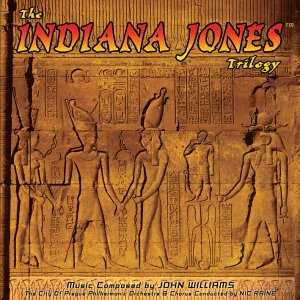************************************************************** EDITOR’s RECOMMENDATION January 2003 **************************************************************
The Indiana Jones Trilogy
Music composed by John Williams
"Anything Goes" by Cole Porter
Vocal on "Anything Goes" by Helen Hobson
Additional ethnic instruments by Gareth Williams
The City of Prague Philharmonic Orchestra and Choir
Conducted by Nic Raine (tracks 9 & 15 conducted by Paul Bateman)
Available on Silva Screen Records FILMCD 365
Playing time: 73:05
Dolby Surround / HDCD
Amazon UK Amazon US

There are 14 tracks on this album drawn from John Williams' scores for the Lucas/Spielberg Indiana Jones movies, together with two versions of the Cole Porter song 'Anything Goes', featured in the second film of the trilogy. All are re-recordings, with five pieces following the original Williams/Herbert Spencer arrangements and orchestrations, the remainder being arranged by conductor Nic Raine or Christopher Tin. The versions of 'Anything Goes', one in Chinese, one in English, are orchestrated by Mike Townend based on Williams' arrangement of the Cole Porter song, and feature the sound of tap dancing by the Janet Cliff School of Music and Drama. The point of noting all this is to emphasis that these are not original soundtracks and should not be judged as such nor criticised for failing to sound like the originals in every detail. Anyone who objects to re-recordings because they inevitably sound different to the first recording should stick with the original soundtrack albums.
The appeal of this disc is to provide on one easily accessible selection of highlights from a very popular series of films. As such it is inevitably of more appeal to the mainstream film fan with a casual interest in film music, than it is to the completist collector. That aside, this album is tremendous fun and demonstrates a sense of style and flair which shows just how far the City of Prague Philharmonic have come in the last decade or so. This is truly, rousing, thrilling stuff which can not fail but to put a smile on the face of all but the most dour and nit-picking of listeners.
Williams' 'Raiders March' has a real swagger and heroic spring in its step, though if the album has a fault it is that by including the end title suites from all three films (Raiders of the Lost Ark, Indiana Jones and the Temple of Doom, Indiana Jones and the Last Crusade) one does get to hear it in so many variations that it does begin to outstay its welcome just a little. Some of the other action music from the series might have proved a better choice. There is of course still a great deal of fine action writing here, from 'The Basket Game' to 'The Mine Car Chase' to 'Escape from Venice', not to mention the glorious romance of 'Marion's Theme' from the first of the trilogy.
The cues which vary from the original film arrangements are still firmly within the sweeping, lavishly orchestrated Williams' tradition, and really leave no room for complaint considered the whole is delivered with such style and aplomb. The versions of 'Anything Goes', complete with tap dancing, are exhilarating, with Helen Hobson capturing the joy of the occasion. The sound too is very good, and certainly preferable to the rather dry, harsh sound of the Last Crusade soundtrack CD. However, the album does sound better in stereo than Dolby Surround, which tends to lack focus. A full SACD / DTS / Dolby Digital 5.1 issue would doubtless prove far superior.
A big, bold, hugely enjoyable album filled with some of John Williams' most popular music. Those who prefer originals should stick with the soundtracks, but everyone else should have a great time with this disc.
Gary Dalkin
4
Mark Hockley adds:-
Some examples of film music seem to define a certain genre or even era in cinematic terms and with John Williams' iconic work on the Indiana Jones trilogy he has created something which will live in our hearts and minds for a very long time indeed. The man is a genius, there is no questioning that, he understands the human soul and can evoke every emotional response imaginable through his music.
While the interpretation of the instantly recognisable 'Raiders March' lacks some of the vitality of the original, the outstanding track of the first film's score (and the two that followed for that matter) is undoubtedly 'The Map Room: Dawn' and here it gets a very strong reading, retaining all of the mystery and awe that Williams intended. But recapturing the finely balanced magic of the original performances is a very challenging prospect and a number of times the brass section in particular ('The Basket Game' for instance) fails to quite capture the spirit required. But this is nit-picking really because all of the important moments are present and correct and there to be enjoyed and few would expect these new versions to be quite as good as Williams' own I'm sure. Certainly in terms of pure musical value for money it's hard to criticise.
I suppose it would be fair to point out that most John Williams admirers are likely the already own copies of the soundtracks to each of the films represented here, so this collection must be aimed at the more casual fan or those on a tight budget (something which I can relate to!). With this in mind, I have no hesitation in recommending this CD with the proviso that it would be well worth upgrading to the real thing at the earliest opportunity.
Mark Hockley
4
Return to Index